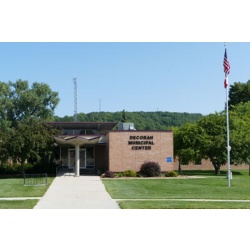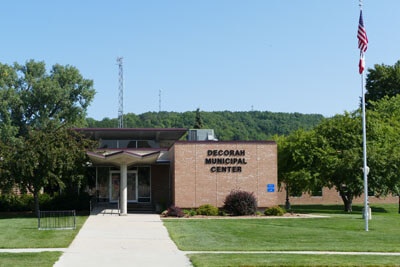
City of Decorah's borrowing will impact next year's budget
The proposed 2019-2020 budget for the City of Decorah calls for a total of $14,231,906 in spending. But not all spending impacts property tax rates in the same way. For next year's city budget, it is the city's borrowing of funds that is having the greatest impact compared to this year's budget.
The city will be repaying loans it took out in 2014, 2016, 2018 and 2019. There will be $348,538 in payments ($255,00 in principal and $93,538 in interest) for the 2014 Highway 9 water and sewer improvement project, which extended utilities up the hill on Highway 9. 2016's loan was for the purchase of a new ladder truck for the Decorah Fire Department. There will be $231,750 in payments ($225,000 in principal and $6,750 in interest) on that loan in 2019-2020. There were two loans taken out in 2018. One loan was for $1,050,000 for construction at the Decorah Airport, which will result in a total of $89,729 in payments--$62,000 of which will be paid by Gundersen Health Systems for hangar rent, leaving $27,729 in interest payments which will be paid by the city. The second loan of $375,000 for sewer and water improvements at the Highway 9 and Highway 52 intersection will result in $129,375 in loan payments, but those will be repaid through charges. Finally, the City of Decorah will pay $250,000 in principal and $26,857 in interest for a $750,000 loan being taken out to do repairs to several city properties. $550,000 of that total has been allocated to the Decorah Public Library, while the remaining $200,000 will pay for repairs involving the fire station and the water department.
In all, the City of Decorah will make $1,076,249 in loan payments in 2019-2020--$912,000 in principal and $164,249 in interest payments. Those costs will generate a total debt levy of $2.18 per $1,000 of assessed valuation out of the city's $14.20 per $1,000 total tax levy, compared to a rate of $1.67 per $1,000 for this year's debt levy. The combined tax rate has gone up 12 cents per $1,000 from this year's property tax levy, but the debt levy will go up 51 cents per $1,000, while the general levy will go down 39 cents per $1,000.
Site designed and maintained by Iroc Web Design Services©.
Your Small Business Web Design Solutions.™


